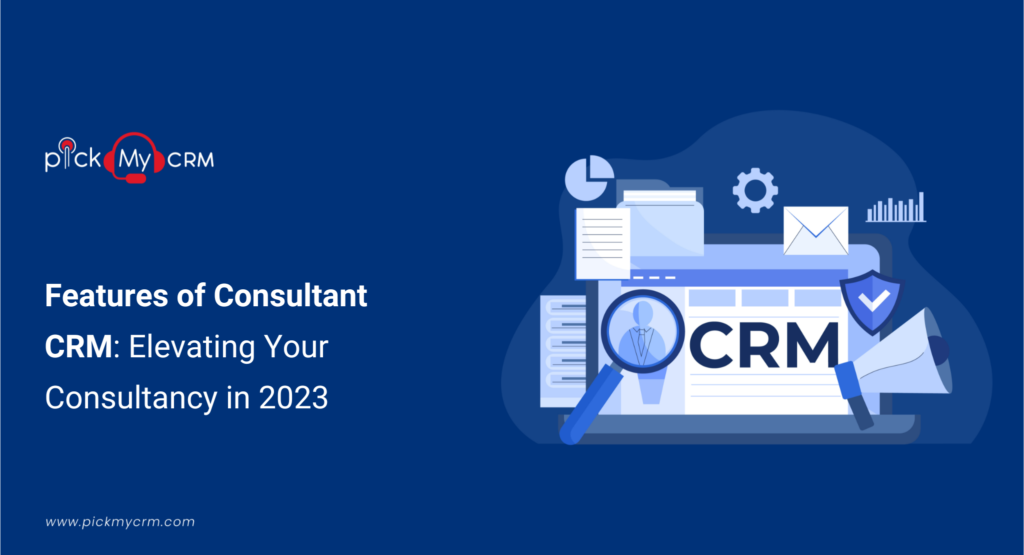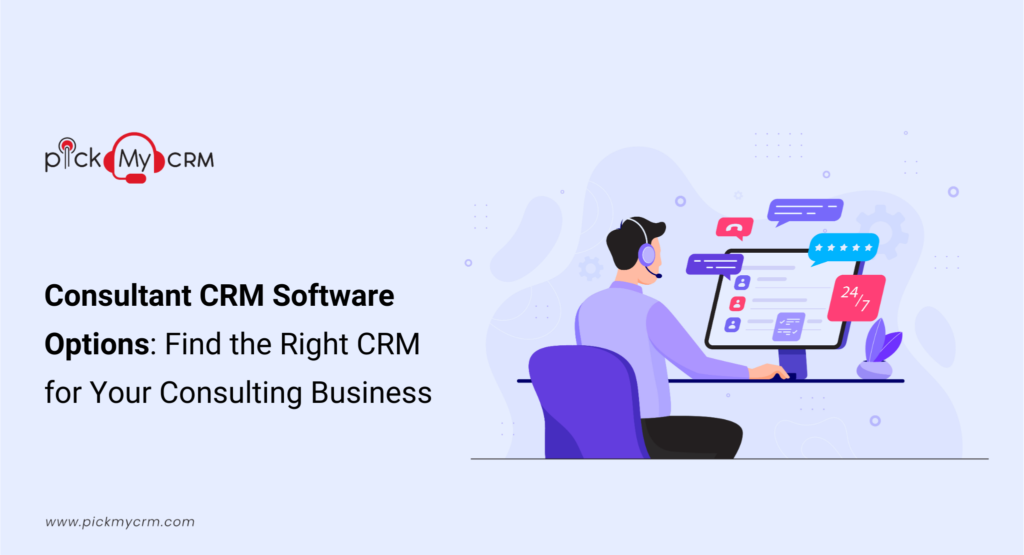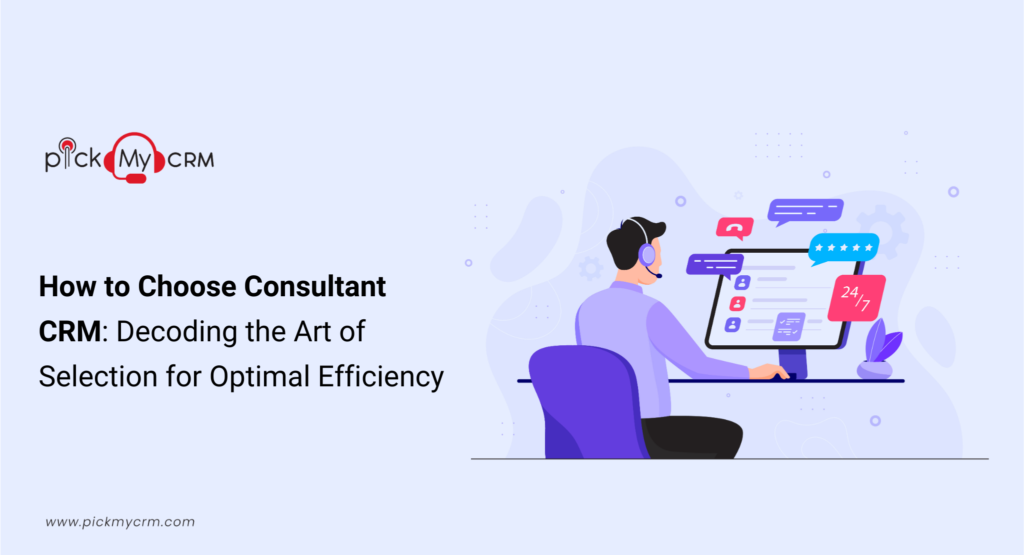What is a Consultant CRM? Unlocking the Secrets to Customer Relationship Success
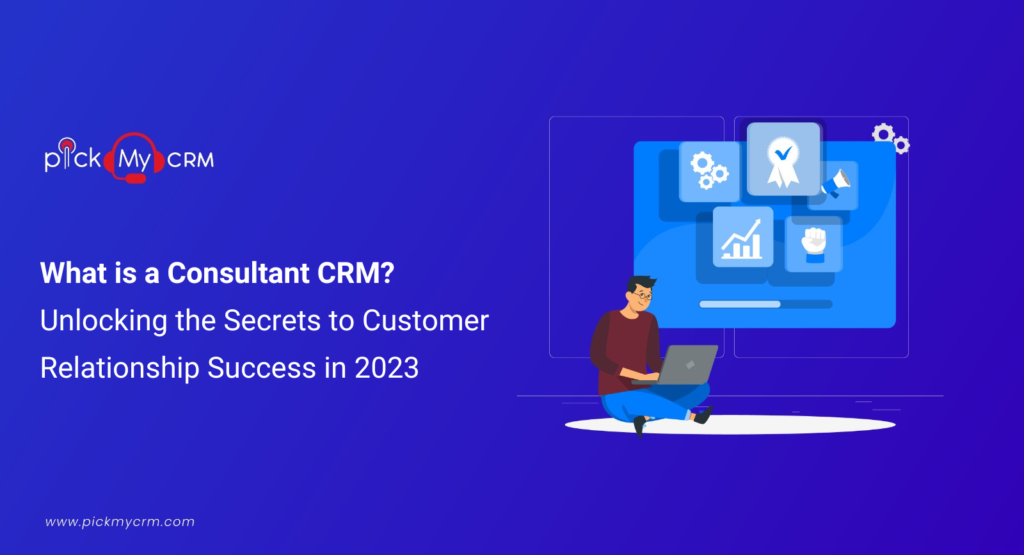
Recent Stats and Trends
In 2023, the business world is witnessing a transformation. Recent statistics reveal that businesses that invest in CRM consulting services are reaping substantial rewards. A remarkable 30% increase in customer retention rates and a significant 25% boost in overall revenue are just a glimpse of the potential benefits. CRM consultants are the driving force behind these impressive statistics, and their role is more vital than ever in helping companies navigate the intricacies of modern customer-centric strategies.What is a Consultant CRM?
A CRM consultant is a Professional who specializes in helping businesses implement, customize, and optimize CRM systems to meet their unique needs. They possess in-depth knowledge of CRM software and work closely with clients to understand their business objectives, assess requirements, and provide tailored solutions. CRM consultants act as advisors, strategists, and implementers, guiding organizations throughout the Entire CRM journey. These consultants play a critical role in harnessing the power of CRM systems for businesses. They evaluate CRM platforms, customize workflows, and ensure seamless integration with other systems. Additionally, they provide training, ongoing support, and maintenance to ensure Effective user adoption. With their expertise, businesses can optimize customer relationships, streamline processes, and make data-driven decisions, leading to sustainable growth in today's competitive landscape.What does a Consultant CRM do?
A CRM (Customer Relationship Management) consultant Plays a crucial role in helping businesses optimize their CRM systems and strategies to enhance customer relationships and drive growth. Here is a breakdown of what a CRM consultant does,Assessment and Analysis
The consultant begins by Conducting a thorough assessment and analysis of the client's existing CRM infrastructure. It includes evaluating the technology stack, data quality, and user adoption rates. Through this process, they identify areas that require improvement.Customization and Integration
CRM consultants tailor the CRM system to meet the needs of the business. It may involve customizing fields, workflows, and automation processes to ensure the CRM aligns with the client's unique Processes. They also facilitate the integration of the CRM with other essential software systems, such as marketing automation or sales tools.Data Management
Clean and accurate data is crucial for effective CRM operations. CRM consultants implement data cleansing and enrichment processes to maintain a high-quality database. They guarantee that the CRM system contains current and trustworthy customer data.User Training and Adoption
Even the most advanced CRM system is only valuable if it is adopted and effectively used by the team. CRM consultants offer comprehensive training and support to maximize employee proficiency using the CRM system. They may also create user-friendly documentation and resources.Performance Monitoring and Optimization
Continuous improvement is a core aspect of CRM consulting. Consultants monitor the CRM system's performance, gather user feedback, and identify areas for optimization. They propose updates and enhancements to align the CRM with evolving business goals.Strategy Development
CRM consultants often assist in developing customer-centric strategies. They help businesses leverage CRM data for strategic planning, targeted marketing campaigns, and personalized customer interactions. Consultants provide insights into improving customer engagement and satisfaction.Technology Recommendations
CRM consultants stay informed about industry trends and emerging technologies. They recommend and Implement the latest CRM features and integrations to keep businesses competitive and agile. It includes exploring advancements in artificial intelligence and automation to enhance CRM capabilities.Change Management
Implementing changes to CRM systems and strategies can sometimes face resistance from employees. CRM consultants are skilled in change management and can help businesses navigate this process effectively, ensuring a smooth transition.Troubleshooting and Support
In addition to initial implementation, CRM consultants provide ongoing support. They troubleshoot issues, address challenges, and ensure that the CRM system continues to meet the client's needs.Measuring ROI
CRM consultants help clients measure the return on investment (ROI) from CRM initiatives. They track key performance indicators (KPIs) to assess the impact of CRM improvements on customer retention, revenue growth, and operational efficiency.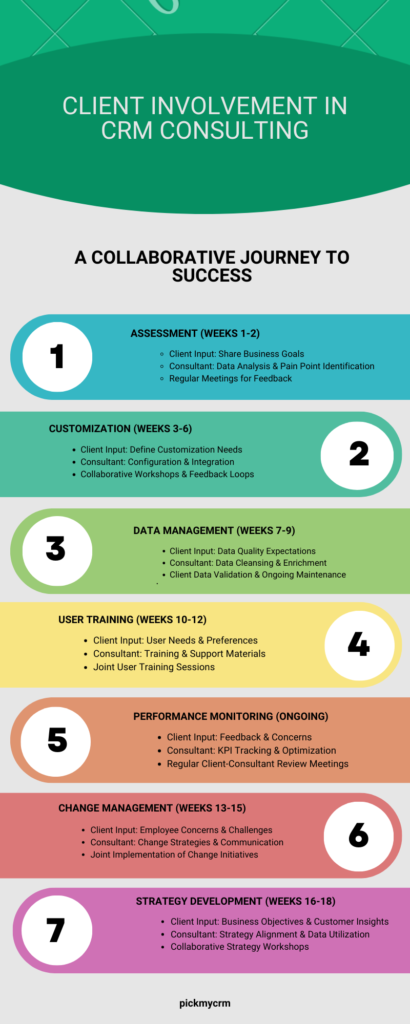 A CRM consultant specializes in optimizing CRM systems and strategies. They assist businesses in harnessing the full potential of their CRM investments, ultimately leading to improved customer relationships, enhanced revenue, and sustainable growth.
A CRM consultant specializes in optimizing CRM systems and strategies. They assist businesses in harnessing the full potential of their CRM investments, ultimately leading to improved customer relationships, enhanced revenue, and sustainable growth.
Why is Consultant CRM Important?
Effective CRM is more than just software; it's a holistic approach to understanding, managing, and nurturing customer relationships. CRM consultants bring immense value to businesses in various ways,- Maximizing CRM Investment: CRM systems represent significant investments. CRM consultants maximize businesses' ROI by optimizing system features and capabilities.
- Enhancing Customer Relationships: A well-implemented CRM strategy leads to improved customer relationships. CRM consultants facilitate deeper customer connections, resulting in increased loyalty and retention.
- Data-Driven Decision-Making: CRM consultants empower businesses to make data-driven decisions. They provide valuable insights from customer data to drive strategic planning and marketing efforts.
- Efficient Operations: Streamlining business processes is an aspect of CRM consulting. Consultants help businesses automate workflows and integrate CRM with other systems for smoother operations.
- Customization and Personalization: One size does not fit all in CRM. Consultants customize CRM systems to align with precise business requirements, enabling personalized customer interactions.
How to Become a CRM Consultant?
Becoming a CRM Consultant necessitates a blend of education, skill enhancement, and hands-on experience. Below is a step-by-step guide outlining the path to becoming a CRM consultant,- Education: Begin with a relevant bachelor's degree in business, marketing, or IT.
- Experience: Gain experience in sales, marketing, or customer service.
- CRM Systems: Familiarize yourself with CRM platforms like Salesforce, Microsoft Dynamics, and HubSpot.
- CRM Courses: Enroll in CRM courses and workshops to learn system functionality and best practices.
- Certifications: Earn certifications in CRM platforms to demonstrate expertise.
- Technical Skills: Develop technical proficiency in configuring and customizing CRM systems.
- Analytical Skills: Enhance your analytical skills for data-driven insights.
- Project Management: Consider project management training for managing CRM projects.
- Industry Knowledge: Gain industry-specific knowledge if specializing in particular sectors.
- Networking: Build a professional network by attending conferences and joining industry associations.
- Portfolio: Create a portfolio showcasing your CRM projects and certifications.
- Job Opportunities: Apply for CRM-related Jobs or freelance positions to start your career.
- Continuous Learning: Stay updated on CRM trends and best practices.
- Client Experience: Gain experience by working with clients and completing successful projects.
- Certify as a CRM Consultant: Some organizations offer specific CRM consultant certifications. Earning these certifications can further enhance your credibility.
- Market Yourself: Establish an online presence highlighting your expertise and projects.
- Consulting Firms: Consider working for CRM consulting firms to gain experience.
- Exceptional Service: Deliver high-quality work and service to build a strong reputation.
When Should You Consider Hiring a Consultant CRM?
Hiring a CRM consultant can be a strategic move in several scenarios,- CRM Implementation: When implementing a new CRM system or transitioning to a different platform, a Consultant ensures a smooth and successful adoption process.
- Process Improvement: If your current CRM system isn't delivering the desired results or is underutilized, a consultant can identify areas for improvement.
- Addressing Data Quality Issues: When faced with inconsistent, outdated, or inaccurate CRM data, a consultant can introduce data management strategies to safeguard data integrity.
- Change Management: When organizational changes affect CRM adoption or user resistance is high, a consultant helps manage the transition effectively.
Where to Find Consultant CRM?
CRM consultants are available through various channels,- Consulting Firms: Many consulting firms specialize in CRM consulting. They have teams of experts ready to assist businesses of all sizes.
- Freelancers: Independent CRM consultants offer their services on a freelance basis. They may have niche expertise or cater to specific industries.
- Online Platforms: Online platforms, such as LinkedIn, Upwork, and specialized CRM consulting directories, can help you find qualified consultants.
Features of Consultant CRM
Key features of CRM consultants include,- Proficiency and Approaches in CRM Systems.
- Technical proficiency in CRM software.
- Analytical skills for data-driven insights.
- Change management expertise.
- Strong project management capabilities.
- Industry-specific knowledge.
- Effective communication skills.
- Focus on maximizing ROI.
Potential Disadvantages of Consultant CRM
While CRM consultants offer numerous benefits, there are potential disadvantages to consider:- Cost: Hiring consultants can be expensive.
- Implementation Time: Consulting projects can take time to complete.
- Resistance to Change: Employees may resist CRM-related changes.
- Dependency: Some businesses may become overly reliant on consultants.
Benefits of Hiring a Consultant CRM
Hiring a CRM consultant offers several key benefits, including expertise in CRM systems, customized solutions tailored to your business needs, time and cost savings, enhanced efficiency and productivity, and seamless integration of Data. Additionally, CRM consultants provide user adoption training, enable data-driven decision-making, improve customer relationships, offer ongoing support and maintenance, and help businesses gain a competitive advantage in the Industry.Types of Consultant CRM
Implementation Consultants
- Focus on setting up and configuring CRM systems.
- Ensure CRM aligns with the client's specific needs.
- Handle technical aspects of CRM deployment.
Strategy Consultants
- Specialize in CRM strategy and planning.
- Develop customer-centric strategies for businesses.
- Help clients define CRM objectives and align them with overall goals.
Data Consultants
- Experts in data management and quality.
- Responsible for data cleansing, enrichment, and maintenance.
- Ensure CRM databases are clean, accurate, and up-to-date.
Platform-Specific Consultants
- Specialize in a specific CRM platform (e.g., Salesforce, Microsoft Dynamics, HubSpot).
- Focus on implementing, customizing, and optimizing that platform.
Integration Consultants
- Specialize in integrating CRM systems with other software and applications.
- Ensure seamless data flow and communication across platforms.
Change Management Consultants
- Focus on managing organizational and human aspects of CRM adoption.
- Help employees adapt to changes in processes and culture resulting from CRM implementation.
Marketing Automation Consultants
- Integrate CRM with marketing automation platforms.
- Create and manage targeted marketing campaigns based on CRM data.
Data Analytics Consultants
- Specialize in analyzing CRM data to derive actionable insights.
- Help businesses make data-driven decisions to enhance customer relationships.
Customer Service Consultants
- Optimize CRM systems for efficient customer service and support.
- Ensure businesses can effectively manage and respond to customer inquiries.
Small Business CRM Consultants
- Tailor CRM solutions to meet the unique needs and budget constraints of Small businesses.
- Offer cost-effective CRM solutions.
Enterprise CRM Consultants
- Handle complex CRM implementations and customizations for large organizations.
- Address scalability and advanced requirements.
Nonprofit CRM Consultants
- Understand the specific needs of nonprofit organizations.
- Support donor management, fundraising, and engagement strategies.
Industry-Specific CRM Consultants
- Specialize in specific industries (e.g., healthcare, finance, real estate).
- Offer CRM solutions tailored to industry-specific requirements and regulations.
User Adoption Consultants
- Emphasis on User Adoption of CRM Systems.
- Provide training, user support, and strategies for maximizing user engagement.
CRM Security and Compliance Consultants
- Specialize in ensuring CRM systems adhere to security and compliance standards.
- Help businesses protect sensitive customer data and maintain regulatory compliance.
CRM Performance Optimization Consultant
- Focus on improving CRM system performance, responsiveness, and efficiency.
- Ensure businesses get the most out of their CRM investments.
Top 3 Consultant CRM Software in 2023
Monday.com CRM
Best CRM Tool for Consultants Monday.com is the top CRM for Consultants, boasting customizable templates and an intuitive drag-and-drop interface for tailoring your CRM to specific needs. This comprehensive platform provides powerful tools for nurturing relationships, ensuring your calendar remains consistent throughout the year. Main Features- Pipeline Management: Easily track leads' positions in the sales funnel and perform bulk actions like contacting specific groups.
- Workflow Automation: Automate processes, from data collection to marketing campaigns, enhancing productivity with custom rules.
- Data Import and Export: Quickly import/export contacts in CSV or XSL files, simplifying large-scale contact management.
- Individual (Free)
- Basic: $8 per seat/month
- Standard: $10 per seat/month
- Pro: $16 per seat/month
- Enterprise: Custom pricing
Pipedrive
Ideal for Consultants Seeking a Visual-Centric CRM Pipedrive is the ideal choice for consultants seeking a visual-based CRM solution. It provides a comprehensive view of your sales activities, helping you focus on the most important deals. With over 90,000 customers globally, Pipedrive is one of the fastest-growing CRM for consultants, simplifying pipeline management for higher conversions. Main Features- 360-Degree Customer View: Access client profiles with comprehensive interaction histories, making it easy to find relevant data.
- Sales Forecasting: Predict future sales with pipeline data to anticipate market changes and refine your strategies.
- AI-Powered Chatbots: Engage website visitors in real-time with Lead Gen Bot and Answer Bot to build a qualified sales pipeline.
- Essential: $12.50 user/month
- Advanced: $24.90 user/month
- Professional: $49.90 user/month
- Enterprise: $99 user/month
Freshsales
Best All-in-One CRM Software for Growing Teams Freshsales is an all-in-one CRM software ideal for growing consulting teams. It provides a lightweight yet powerful CRM solution with an intuitive user interface. This unified contact management hub helps monitor customer interactions while addressing their concerns effectively. Main Features:- Telephony: Make and record calls, complete with enhanced caller ID, call scripts, and call forwarding.
- Sales Performance Management: Evaluate your team's performance and identify areas for improvement.
- Lead Management: Gather and evaluate leads from diverse sources, leaving no Lead unnoticed.
- Free
- Growth: $18 user/month
- Pro: $47 user/month
- Enterprise: $83 user/month

